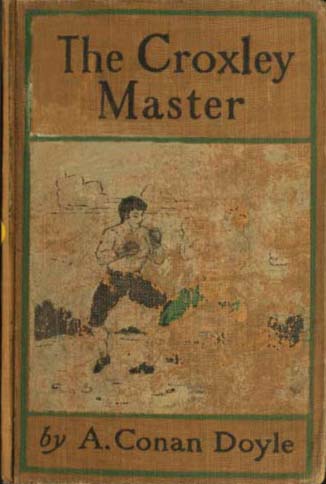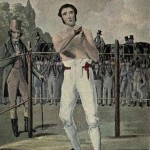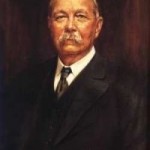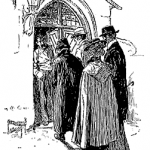
I
MR. ROBERT MONTGOMERY was seated at his desk, his head upon his hands, in a state of the blackest despondency. Before him was the open ledger with the long columns of Dr. Oldacre’s prescriptions. At his elbow lay the wooden tray with the labels in various partitions, the cork box, the lumps of twisted sealing-wax, while in front a rank of empty bottles waited to be filled. But his spirits were too low for work. He sat in silence, with his fine shoulders bowed and his head upon his hands.
Outside, through the grimy surgery window over a foreground of blackened brick and slate, a line of enormous chimneys like Cyclopean pillars upheld the lowering, dun-coloured cloud-bank. For six days in the week they spouted smoke, but to-day the furnace fires were banked, for it was Sunday. Sordid and polluting gloom hung over a district blighted and blasted by the greed of man. There was nothing in the surroundings to cheer a desponding soul, but it was more than his dismal environment which weighed upon the medical assistant.
His trouble was deeper and more personal. The winter session was approaching. He should be back again at the University completing the last year which would give him his medical degree; but alas! he had not the money with which to pay his class fees, nor could he imagine how he could procure it. Sixty pounds were wanted to make his career, and it might have been as many thousands for any chance there seemed to be of his obtaining it.
He was roused from his black meditation by the entrance of Dr. Oldacre himself, a large, clean-shaven, respectable man, with a prim manner and an austere face. He had prospered exceedingly by the support of the local Church interest, and the rule of his life was never by word or action to run a risk of offending the sentiment which had made him. His standard of respectability and of dignity was exceedingly high, and he expected the same from his assistants. His appearance and words were always vaguely benevolent. A sudden impulse came over the despondent student. He would test the reality of this philanthropy.
“I beg your pardon, Dr. Oldacre,” said he, rising from his chair; “I have a great favour to ask of you.”
The doctor’s appearance was not encouraging. His mouth suddenly tightened, and his eyes fell.
“Yes, Mr. Montgomery?”
“You are aware, sir, that I need only one more session to complete my course.”
“So you have told me.”
“It is very important to me, sir.”
“Naturally.”
“The fees, Dr. Oldacre, would amount to about sixty pounds.”
“I am afraid that my duties call me elsewhere, Mr. Montgomery.”
“One moment, sir! I had hoped, sir, that perhaps, if I signed a paper promising you interest upon your money, you would advance this sum to me. I will pay you back, sir, I really will. Or, if you like, I will work it off after I am qualified.”
The doctor’s lips had thinned into a narrow line. His eyes were raised again, and sparkled indignantly.
“Your request is unreasonable, Mr. Montgomery. I am surprised that you should have made it. Consider, sir, how many thousands of medical students there are in this country. No doubt there are many of them who have a difficulty in finding their fees. Am I to provide for them all? Or why should I make an exception in your favour? I am grieved and disappointed, Mr. Montgomery, that you should have put me into the painful position of having to refuse you.” He turned upon his heel, and walked with offended dignity out of the surgery.
The student smiled bitterly, and turned to his work of making up the morning prescriptions. It was poor and unworthy work—work which any weakling might have done as well, and this was a man of exceptional nerve and sinew. But, such as it was, it brought him his board and £1 a week, enough to help him during the summer months and let him save a few pounds towards his winter keep. But those class fees! Where were they to come from? He could not save them out of his scanty wage. Dr. Oldacre would not advance them. He saw no way of earning them. His brains were fairly good, but brains of that quality were a drug in the market. He only excelled in his strength; and where was he to find a customer for that? But the ways of Fate are strange, and his customer was at hand.
“Look y’ere!” said a voice at the door.
Montgomery looked up, for the voice was a loud and rasping one. A young man stood at the entrance—a stocky, bull-necked young miner, in tweed Sunday clothes and an aggressive necktie. He was a sinister-looking figure, with dark, insolent eyes, and the jaw and throat of a bulldog.
“Look y’ere!” said he again. “Why hast thou not sent t’ medicine oop as thy master ordered?”
Montgomery had become accustomed to the brutal frankness of the Northern worker. At first it had enraged him, but after a time he had grown callous to it, and accepted it as it was meant. But this was something different. It was insolence—brutal, overbearing insolence, with physical menace behind it.
“What name?” he asked coldly.
“Barton. Happen I may give thee cause to mind that name, yoong man. Mak’ oop t’ wife’s medicine this very moment, look ye, or it will be the worse for thee.”
Montgomery smiled. A pleasant sense of relief thrilled softly through him. What blessed safety-valve was this through which his jangled nerves might find some outlet. The provocation was so gross, the insult so unprovoked, that he could have none of those qualms which take the edge off a man’s mettle. He finished sealing the bottle upon which he was occupied, and he addressed it and placed it carefully in the rack.
“Look here!” said he turning round to the miner, “your medicine will be made up in its turn and sent down to you. I don’t allow folk in the surgery. Wait outside in the waiting-room, if you wish to wait at all.”
“Yoong man,” said the miner, “thou’s got to mak’ t’ wife’s medicine here, and now, and quick, while I wait and watch thee, or else happen thou might need some medicine thysel’ before all is over.”
“I shouldn’t advise you to fasten a quarrel upon me.” Montgomery was speaking in the hard, staccato voice of a man who is holding himself in with difficulty. “You’ll save trouble if you’ll go quietly. If you don’t you’ll be hurt. Ah, you would? Take it, then!”
The blows were almost simultaneous—a savage swing which whistled past Montgomery’s ear, and a straight drive which took the workman on the chin. Luck was with the assistant. That single whizzing uppercut, and the way in which it was delivered, warned him that he had a formidable man to deal with. But if he had underrated his antagonist, his antagonist had also underrated him, and had laid himself open to a fatal blow.
The miner’s head had come with a crash against the corner of the surgery shelves, and he had dropped heavily onto the ground. There he lay with his bandy legs drawn up and his hands thrown abroad, the blood trickling over the surgery tiles.
“Had enough?” asked the assistant, breathing fiercely through his nose.




